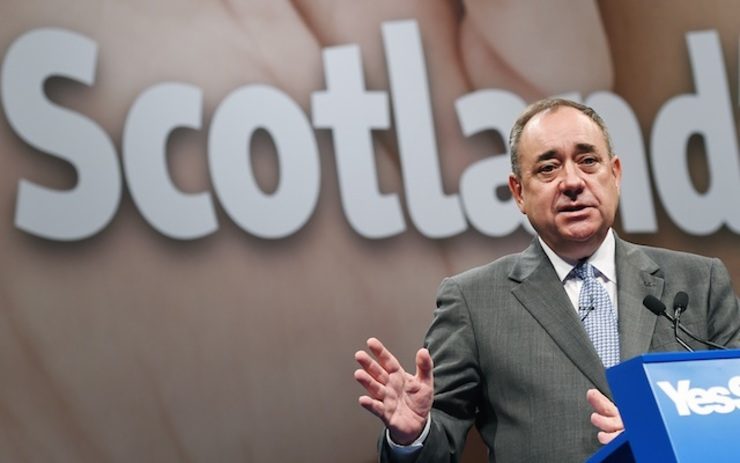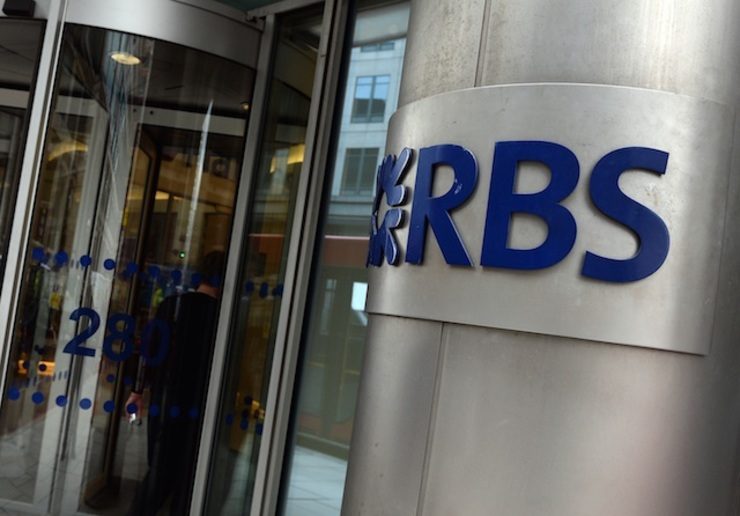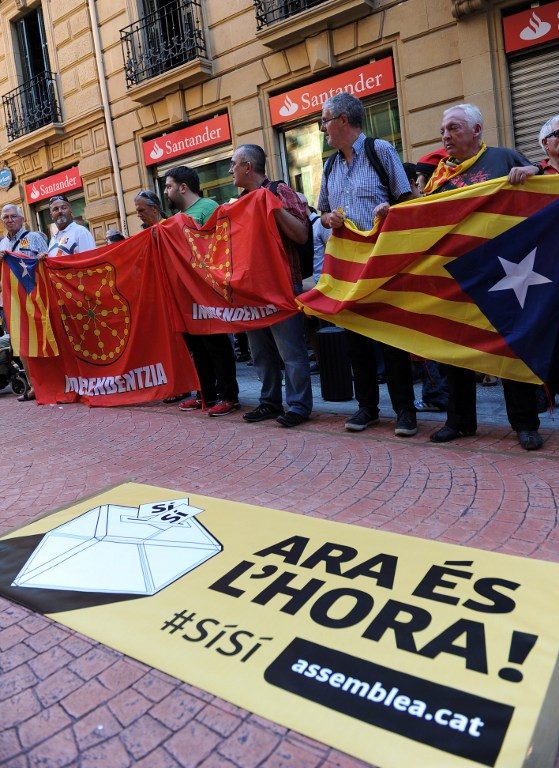SUMMARY
This is AI generated summarization, which may have errors. For context, always refer to the full article.

EDINBURGH, United Kingdom – The eyes of the world are on Scotland’s referendum, pro-independence leader Alex Salmond said Thursday, September 11, as a top bank warned it would re-register in England if the separatists win.
Salmond said the run-up to the September 18 vote was “a process of national empowerment” and promised an independent Scotland would be a “fairer, more profitable” society.
“Scotland is on the cusp of making history. The eyes of the world are upon Scotland,” Salmond said in Edinburgh, a day after British Prime Minister David Cameron also visited the Scottish capital to plead for the preservation of “a family of nations”.
“Scotland will vote ‘Yes’ next Thursday because last-minute… promises from the ‘No’ campaign will not fool anyone,” said First Minister Salmond, who heads up Scotland’s regional government.
“As a country we are rediscovering self-confidence, as a nation we are finding our voice… On September 18, we the people hold our destiny in our own hands,” he added.
‘Huge pressure on Madrid’
Catalans and Scots: Same dreams, different histories
The two campaigns for independence grew out of very different circumstances that could define their success
Polls show Scottish voters are almost evenly divided between the “Yes” and the “No” although only one survey so far has put the pro-independence camp just ahead of the unionists.
The most recent one, published on Wednesday, September 10, by Scotland’s Daily Record newspaper, showed 53% against independence and 47% in favor, without counting undecideds.
The vote would bring to an abrupt end a 307-year-old union between England and Scotland and create the newest state in Europe since the disintegration of Yugoslavia.
Many countries with separatist movements are following the campaign closely including Spain, where the government has ruled out a referendum for Catalan independence or devolution.
“People in Catalonia don’t necessarily want independence but they want to have the right to vote. And they see that here it’s possible,” said Carles Costa from TV3 public television in Catalonia, who was at Salmond’s press conference.
“A ‘Yes’ vote would put a huge pressure on Madrid. Scotland is not a remote country somewhere in the world. It’s just next door,” he said.
“Even with a ‘No’, people in Catalonia will say, ‘Why is this not possible in Spain?'”
Olivier Hanrion from RTBF in Belgium, said there was “obvious” interest in his country which is divided between the Flemish, French and German-speaking communities.
“Devolution means something to Belgians and it has affected them for years,” he said, pointing out that a referendum like Scotland’s would be banned in the Belgian constitution.
But Shuhei Nakayama from Japanese broadcaster NHK said most people in Japan had “a confused idea of the situation”.
“Most don’t know Scotland is already a region with many powers. Some think it’s a country already as they have a football team,” he said.
“It’s very interesting to see a nation that might break away without any violence.”
‘Better together’

As Salmond spoke, the Royal Bank of Scotland warned it would relocate its registered offices in case of a “Yes” vote, saying this was the “responsible and prudent thing to do” but underlining this would not mean shifting jobs.
RBS was bailed out by the British government following the 2008 financial crisis and its announcement came after London-based Lloyds Banking Group also said it had plans on possibly switching key operations from Scotland to England.
Edinburgh-based RBS is 81% owned by the British state, which also retains a 25% stake in bailed-out Lloyds.
Big business leaders have mostly lined up against independence, although the chief executive of Scotland’s largest fund manager, Aberdeen Asset Management, has said that an independent Scotland would be “a big success”.
Many small businesses have supported the independence campaign, saying they want to feel closer to decision-making.
Salmond’s call came after Cameron made an emotional plea to Scots in a bid to reverse a late surge in support for Scottish independence, which has long lagged in the polls.
In what Salmond described as a sign of “panicking”, Cameron and opposition Labour leader Ed Miliband hit the campaign trail north of the border on Wednesday.
The Scotsman newspaper meanwhile came out against independence in an editorial that covered the front page of its Thursday edition, headlined “Scotland’s decision”.
“With the choices before us, the conclusion is that we are better together,” it said.
The Sunday Herald is so far the only Scottish national paper backing independence. – With Dario Thuburn in London, Agence France-Presse/Rappler.com
Add a comment
How does this make you feel?

There are no comments yet. Add your comment to start the conversation.